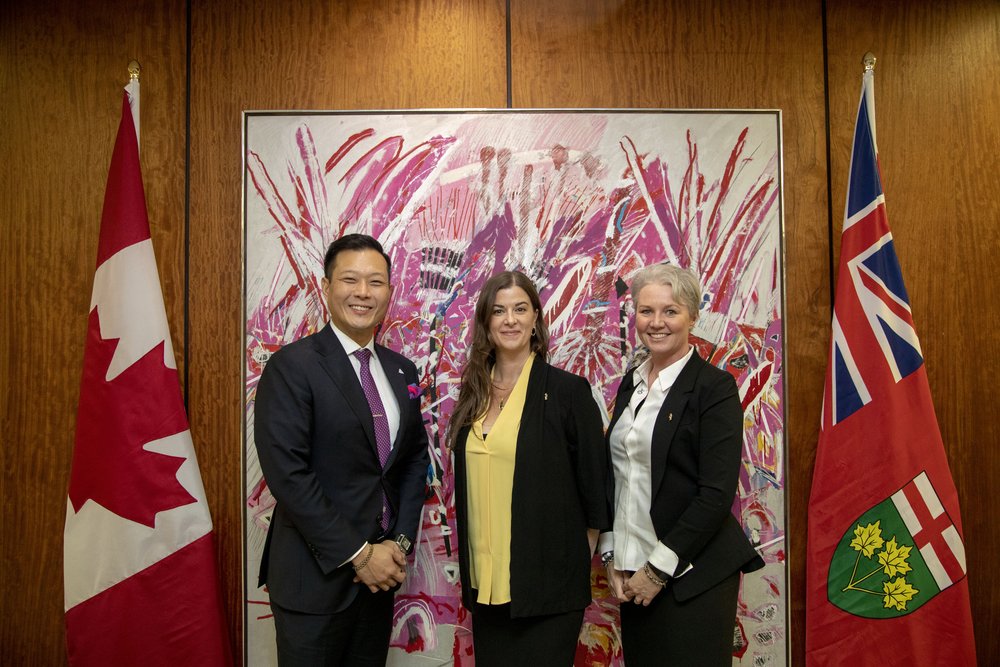
With MPP Stan Cho, Parliamentary Assistant to the Minister of Finance
Throughout the current crisis we’ve been working closely with our contacts at the Ontario Government, including MPP Stan Cho, who represents Willowdale in North York. His role as Parliamentary Assistant to the Minister of Finance gives him a seat at the table during some of the most important economic discussions in recent history. Here, Stan shares his unique vantage point on fiscal planning during a pandemic, Zoom caucus meetings and his advice for small business.
HOW IS ONTARIO’S GOVERNMENT SUPPORTING SMALL BUSINESS DURING THE COVID-19 CRISIS?
The pandemic’s been especially hard on businesses across Ontario’s communities. As a former small business owner, I know how difficult running a business is in the best of times. While the health and safety of Ontarians remains our government’s number one priority, we’re working hard to ensure businesses can survive, preparing them to thrive once again when our economy reopens.
On March 25th we passed an emergency economic update that included an immediate injection of $10 Billion into Ontario’s economy. These measures included deferring most provincial taxes for five months, deferring WSIB premiums, expanding the employer health tax exemption—effectively cutting taxes by $355 Million for 57,000 employers—allowing municipalities to defer property taxes and reducing commercial hydro rates. Since that time, we’ve been working closely with our partners in the Federal Government to introduce further measures like the Canada Emergency Business Account, the Wage Subsidy and the joint Federal-Provincial Commercial Rent Relief Program. The focus thus far has been on reducing pressure and freeing up cash flow for businesses, but as we look to the future our government is preparing further measures to help businesses open up safely and help our economy recover as quickly as possible.
WHAT DO YOU EXPECT THE NEW TIMELINE FOR ONTARIO’S BUDGET WILL BE AND HOW HAS COVID-19 ALTERED FISCAL PLANNING?
Ontario was in some ways more fortunate than other provinces in the timing of our fiscal plan. Unlike Alberta and Quebec that released budgets without forecasts based on the pandemic, Ontario was scheduled to release its budget March 25th. As the province began introducing emergency measures, it became clear that releasing a multi-year fiscal plan amid so much uncertainty would not be prudent. Instead, the government released a one-year economic snapshot based on our best fiscal and health projections at the time. This gave our funding partners like school boards, hospitals and municipalities some certainty and allowed us to fund emergency measures for individuals, families, communities and businesses to the tune of $17 Billion on top of our base funding. But we’ve also committed to releasing our multi-year budget in the fall, on or before November 15th, 2020.
The province also released a framework for reopening Ontario’s economy and lifting some of the emergency measures. This framework sets out criteria that the government will use to determine when measures should be lifted—a gradual phased approach so health officials can monitor the situation for possible new outbreaks. It’s important to recognize that this is a framework, not a calendar—this virus moves fast and we’re going to ease restrictions based on evidence and guidance from health officials. But there’s some good news and we’re starting to have the conversations necessary to open up the economy again.
IN WHAT WAYS HAS THE GOVERNMENT HAD TO ADAPT ITS PROCESSES TO BE MORE EFFECTIVE DURING THE CRISIS?
We too are getting used to new technology—Zoom caucus meetings and teleconference cabinet meetings—but the biggest change I’ve noticed is the speed. Under normal circumstances a new government program can take months if not years to develop, announce and implement. Programs go through rigorous approval processes, policy and finance committees, they’re consulted upon with stakeholders, a narrative is developed, communication materials are prepared, and implementation alone can take months.
During the pandemic, government of all levels has been rolling out new programs at record pace. The amazing men and women in the Ontario Public Service and our political staff have been working around the clock to ensure people are getting the help they need. But in many ways, government isn’t set up to move this quickly. There are inevitable challenges. I think we’ve seen all levels of government be iterative with their programs. If there are gaps, the government will go back and revise the program design, like we saw the Federal Government do with CEBA eligibility and the Wage Subsidy. Premier Ford has been as frank and transparent with Ontarians as possible. I think this has really helped with the public’s cooperation and created understanding when we need to make these iterative changes. We’re asking a lot of people right now—I think what Ontarians really want is to be informed.
WHAT ADVICE DO YOU HAVE FOR SMALL BUSINESSES DURING THIS TIME?
My advice is to take advantage of all the government programs available from all three levels of government, and to not give up hope. We’re starting to see the light at the end of the tunnel. With the public’s continued cooperation on social distancing, we’ll get through this. Ontarians are strong and entrepreneurs are especially so. We have some tough challenges ahead of us, and we all need to continue to do our part to flatten the curve, but things will get better and the government is going to do whatever we can to help.
WHAT’S IT BEEN LIKE WORKING IN GOVERNMENT WITHIN THIS NEW ENVIRONMENT FOR YOU PERSONALLY?
Aside from spending more time at home, my schedule has been as busy as ever. It’s been all hands on deck with my work at the Ministry of Finance, and my constituency office has been working around the clock to make sure people in my riding have all the information they need. A lot of my friends and family are entrepreneurs and small business owners so I get a couple hundred texts and emails a day from people all over the province asking questions and looking for help. I’ve also been calling every single business, charity, church and retirement home in my riding and it’s absolutely devastating to hear some of the stories and the suffering people are going through right now. But, the silver lining for me has been to see the incredible people of this province come together to support one another.
